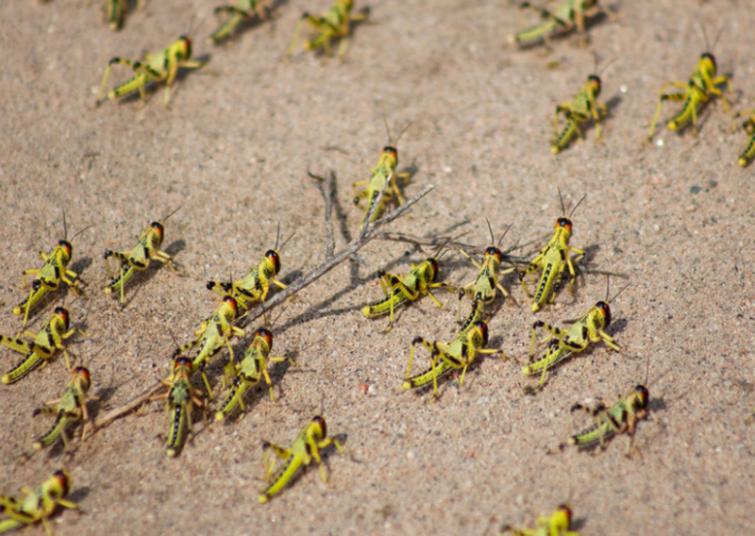
Amid Covid-19 crisis, India puts up battle against the biggest locust attack in last 27 years
Bhopal/Agra/IBNS: After Iran and Pakistan, the locust swarm has now entered India, threatening the country's food security amid the existing economic and health crisis triggered by the outbreak of coronavirus.
According to the Ministry of Environment, Forests and Climate Change, "Locust swarm from Pakistan has entered Rajasthan, Punjab, Haryana and Madhya Pradesh, threatening major damage to standing cotton crops and vegetables. Rajasthan is the most affected state. During the current year, the swarm of locusts has entered India earlier than their normal time of June and July. States are adopting various means for controlling the swarms.”
Locust Control Room pic.twitter.com/RxeJNNUOfy
— Locust Warning Organization, Jodhpur-India (@LocustIndia) May 6, 2020
A total of 11 districts of Rajasthan are hit by locust attack, said officials.
Officials have warned the attack of crop-eating pests is the worst in the last 27 years and may go till monsoon.
According to reports, the Locust Warning Organisation has said India has not seen upsurges since December 2011 with improvement in agricultural technology and advancements in pest control sector. The country has witnessed severe bouts locust attack between 1812 to 1997.
According to a report in The Hindu, a swarm of desert locust containing around 40 million locusts can consume (or destroy) food that would suffice the hunger need of 35,000 people, assuming that one person consumes around 2.3 kg of food every day.
After destroying crops, plant and vegetation in Rajasthan, the swarm of locusts have now entered Uttar Pradesh and Madhya Pradesh.
Locusts were spotted in Rajasthan on April 11, said a TOI report.
"A similar locust attack was reported in 1993 and after around 27 years, locusts attacked Gujarat, Rajasthan, and some parts of Madhya Pradesh," Locust Warning Organisation (LWO) deputy director Dr KL Gurjar, the report added.
The pests entered Madhya Pradesh through Neemuch district in the state, and subsequently travelled to Malwa Nimar and are now close to Bhopal, said reports. Experts have warned if locusts are not stopped the standing Moong cereal crop worth around Rs 8,000 crore could be destroyed.
According to a Times of India report, a fresh swarm of locusts entered Dausa in Rajasthan two days ago and got scattered due to the change in direction of the wind and reached Madhya Pradesh.
Reports said the 17 UP districts that might suffer from the locust attack include Agra, Aligarh, Mathura, Bulandshahr, Hathras, Etah, Firozabad, Mainpuri, Etawah, Farrukhabad, Auraiya, Jalaun, Kanpur, Jhansi, Mahoba, Hamirpur and Lalitpur.
Officials have warned the farmers that the locusts may stop for rest anytime between 7 pm to 9 pm and asked them to monitor their movement.
The administration of the affected districts of UP has deployed over 200 tractors mounted with chemical sprays. Four teams of the central government, apart from teams of state agricultural development, are fighting the pests by using chemical sprays with the help of tractors and fire-brigade vehicles in Madhya Pradesh, said an NDTV report.
The farmers, on their part, have been issued advisory to keep the pests at bay by making loud sounds like beating drums, utensils and shouting, the report added.
Support Our Journalism
We cannot do without you.. your contribution supports unbiased journalism
IBNS is not driven by any ism- not wokeism, not racism, not skewed secularism, not hyper right-wing or left liberal ideals, nor by any hardline religious beliefs or hyper nationalism. We want to serve you good old objective news, as they are. We do not judge or preach. We let people decide for themselves. We only try to present factual and well-sourced news.







